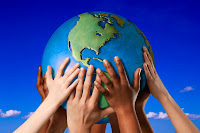
And last, never let your mind become so narrow that you cannot associate with those of another race, color, or way of believing.
--Faith Valk Robbins to Miriam Joy Robbins, 10 May 1967, in "Mother's Message to Her Child" from the Baby Book of Miriam Joy Robbins, pg. 47
With Martin Luther King, Jr.'s birthday coming up next weekend, and the celebration of Black History Month in February, many of us are thinking about the Civil Rights Movement and issues such as diversity, social justice, tolerance (a word I dislike...who out there wants to be merely tolerated?), and acceptance of those different from ourselves.
The quote above written by my mother in my baby book when I was just under two months old. I am very grateful for parents who taught and walked a life of acceptance towards others. Even when our family was faced with several years of intense racism and hatred during a nasty lawsuit in the mid-1970s while living in Southeast Alaska, I never heard them say a negative word. My parents were--and still are--very conservative in their beliefs, but their faith in a loving God who loves all His children is behind their compassion and acceptance of all they meet. Others have not been so fortunate, I know, to have grown up in such a family.

*What was the racial, ethnic, or religious situation in the community where you grew up? Was your family part of a racial, ethnic, or religious majority or minority? Were there differences in your community or family such as developmental disabilities, mental illness, or social class differences? Were there bi-racial or mixed-faith families?
*How did this affect you and your family? Did your family experience discrimination or prejudice, or were family members prejudiced against others? Have you ever feared for your life because of prejudice?
*What were you taught about people who were different from you? Do you still believe this? Why or why not? If not, what made you change your mind?
*Were there households in your neighborhood or community where a couple was co-habitating rather than being legally married? Were there gays and lesbians in your community? Or did you grow up in such a diverse household? What was your family's or the community's reaction to this?
*Do you remember the Civil Rights Movement of the 1960s or the AIM movement of the 1970s? What about the Equal Rights Amendment or the AIDS epidemic? What were your feelings or thoughts on these matters? Did they affect you directly, and how?
*What do you remember about meeting someone for the first time who was different from you in some way? What preconceived ideas were dismantled as you got to know this person as an individual, rather than as a symbol of your differences?
*If you are a person considered "different" by the mainstream, do you have a successful experience to share where you were able to change someone else's preconceived ideas about your diverse situation? How did that occur?
*Are there any oral histories in your family about being able to vote or own land or other civil rights for the first time? What about stories were rights were denied? (George Geder shared some stories of discrimination during his grandfather Jack Hancock's life here. My daughter, who loves to shop, was most distressed at how Jack's daughter Sadye was thrown into jail for staring at a dress in the window of a "for whites only" store.) Are there events in your family history where ancestors or relatives triumphed over social injustice? Were any of your ancestors social reformers? Are you?
As I'm sure you're all aware, the above prompts can bring up some volatile emotions. Please use caution and wisdom if you post your responses on a blog or other public format. These prompts are not meant to cause an uproar; the purpose of these prompts, as always, remains a way for you to tell succeeding generations about your life story.










2 comments:
Great Post!
I am working on my post today, but in the meantime, I touched upon this very subject in Race and Family History on my blog back in November 2007.
Post a Comment